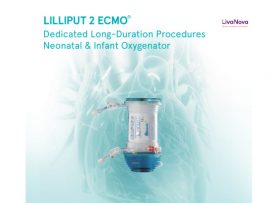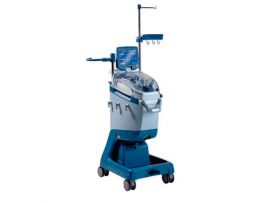Abstract Introduction: In remote hospital settings, providing timely and effective extracorporeal cardiopulmonary resuscitation (ECPR) is challenging due to infrastructure limitations and accessibility issues. We are highlighting the importance of grab-and-go ECPR..
Lee masAbstract Background There is significant variability in postoperative neurological injury rates in patients with , with early injuries impacting long-term neurodevelopmental outcomes; therefore, there is an urgent need for identifying effective..
Lee masAbstract Data describing the use of extracorporeal membrane oxygenation (ECMO) in pediatric acute liver failure (PALF) are scarce. Thus, we aimed to describe the use of ECMO in patients with..
Lee masAbstract Calcium channel blocker (CCB) toxicity presents a significant mortality risk, highlighting the need for effective treatment strategies such as extracorporeal membrane oxygenation (ECMO). This study analyzes Extracorporeal Life Support..
Lee masAbstract Purpose: Patients receiving venoarterial extracorporeal membrane oxygenation (VA‑ECMO) frequently develop arte‑rial hyperoxaemia, which may be harmful. However, lower oxygen saturation targets may also lead to harmful episodes of hypoxaemia...
Lee masAbstract Introduction The primary aim was to describe the outcome, the compliance with inclusion criteria and the characteristics of patients who underwent extracorporeal cardiopulmonary resuscitation (ECPR) for out-of-hospital cardiac arrest..
Lee masAbstract Aims Current data are insufficient for the leading resuscitation societies to advise on the use of extracorporeal cardiopulmonary resuscitation (ECPR) for pediatric out-of-hospital cardiac arrest (OHCA). The aim of..
Lee masAbstract Aims This study explores the evolution of organ donation from patients treated with extracorporeal-cardiopulmonary-resuscitation (ECPR) for refractory out-of-hospital-cardiac-arrest (OHCA) and evaluates the public health benefits of a mature ECPR..
Lee masAbstract Perioperative cardiac arrest (POCA) is a catastrophic complication that requires immediate recognition and correction of the underlying cause to improve patient outcomes. While the hypoxia, hypovolemia, hydrogen ions (acidosis),..
Lee masAbstract Background Clinical blood resources are scarce and autologous blood transfusion for extracorporeal membrane oxygenation (ECMO) withdrawal is less studied. Objectives To assess the use of staged during decannulation. Methods The study..
Lee masAbstract Background Cardiac arrest after coronary artery bypass grafting (CABG) is a serious complication with low survival rate. The prognosis of patients with cardiac arrest in the general ward is..
Lee masAbstract Objective: Epidemiologic data on extracorporeal cardiopulmonary resuscitation (ECPR) use in children with cardiac disease after in-hospital cardiac arrest (IHCA) are lacking. We aimed to investigate trends in ECPR use..
Lee masAbstract Background Cardiac arrest is associated with high mortality rates and severe neurological impairments. One of the underlying mechanisms is global ischemia-reperfusion injury of the body, particularly the brain. Strategies..
Lee masAbstract Cardiac arrest is a hyper-acute condition with a high mortality that requires rapid diagnostics and treatment. As such, point-of-care ultrasound (POCUS) has become a valuable tool in the assessment..
Lee masAbstract Purpose Veno-arterial extracorporeal life support (ECLS) is increasingly used in patients during cardiac arrest and cardiogenic shock, to support both cardiac and pulmonary function. We performed a systematic review..
Lee masAbstract Massive/high-risk pulmonary embolism (PE) is associated with a 30-day mortality rate of approximately 65%. In searching for strategies that may make a dent on this dismal mortality rate, investigators..
Lee masAbstract Background Risk-stratifying patients with (CS) is a major unmet need. The recently proposed Society for Cardiovascular and Interventions (SCAI) staging system for CS severity lacks uniform criteria defining each stage. Objectives..
Lee masAbstract We present the case of a 62-year-old man with severe coronary artery disease who presented to the hospital in refractory ventricular fibrillation cardiac arrest. He showed signs of life..
Lee masAbstract Introduction The use of cardiopulmonary resuscitation (ECPR) for refractory cardiac arrest is increasing globally. However, providing equity of access to all patients is challenging, and to date, access has been..
Lee masAbstract Introduction The trial hypothesized that minimally invasive extra-corporeal circulation (MiECC) reduces the risk of serious adverse events (SAEs) after cardiac surgery operations requiring extra-corporeal circulation without circulatory arrest. Methods..
Lee masAbstract Background We aimed to estimate the effect of extracorporeal cardiopulmonary resuscitation (ECPR) on neurological outcome and mortality, when compared to conventional cardiopulmonary resuscitation (CCPR), using an individual patient data..
Lee masAbstract Background Extracorporeal membrane oxygenation (ECMO) is increasingly being used for critically ill patients with cardiopulmonary failure. Air in the ECMO circuit is an emergency, a rare but fatal complication...
Lee masAbstract Objective To analyze if the implementation of a multidisciplinary extracorporeal cardiopulmonary resuscitation (ECPR) program in a tertiary hospital in Spain is feasible and could yield survival outcomes similar to..
Lee masAbstract OBJECTIVES: To determine the actual cost and drivers of the cost of an extracorporeal cardiopulmonary resuscitation (E-CPR) care cycle. PERSPECTIVE: A time-driven activity-based costing study conducted from a healthcare..
Lee masAbstract The clinical tolerance of extracorporeal membrane oxygenation (ECMO) membrane changes in acute respiratory distress syndrome (ARDS) patients under veno-venous ECMO (VV-ECMO) has not been reported. The aim of this..
Lee masAbstract Background Prospective, trial-based data comparing health-related quality of life (HRQoL) in patients surviving out-of-hospital cardiac arrest (OHCA) through extracorporeal cardiopulmonary resuscitation (ECPR) or conventional CPR (CCPR) are scarce. We..
Lee masAbstract This scientific statement presents a conceptual framework for the pathophysiology of post–cardiac arrest brain injury, explores reasons for previous failure to translate preclinical data to clinical practice, and outlines..
Lee masAbstract Background The outcomes of several randomized trials on extracorporeal cardiopulmonary resuscitation (ECPR) in patients with refractory out-of-hospital cardiac arrest were examined using frequentist methods, resulting in a dichotomous interpretation..
Lee masAbstract Background. Withdrawal of life-sustaining therapy (WLST) performed in the circulatory determination of death (DCD) donors leads to cardiac arrest, challenging the utilization of the myocardium for transplantation. The rapid..
Lee masAbstract Background We previously found that cardioplegic arrest and cardiopulmonary bypass are associated with altered coronary arteriolar response to serotonin in patients undergoing cardiac surgery. In this study, we investigate..
Lee mas


















